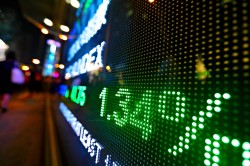When it comes to dividend stocks, Coca-Cola Company (NYSE:KO) is a household name. In fact, the beverage giant just approved its 57th consecutive annual dividend increase, bumping it up to $0.40 per share and a juicy yield of 3.5%. But if investors are looking for even bigger dividend yields for their portfolios, three Motley Fool contributors suggest taking a peek at Macy's (NYSE:M), Oaktree Capital Group (NYSE:OAK), and General Motors (NYSE:GM). Here's why.
A cash-generating retailer
Jeremy Bowman (Macy's): One dividend stock that I think continues to look appealing, especially to contrarian investors, is Macy's, the department-store chain that has essentially defined the category for more than a century.
Today, Macy's offers a 6.1% dividend yield, much better than Coca-Cola's at 3.5%, and the company is stably profitable despite concerns about a "retail apocalypse." Macy's just wrapped up a year with comparable sales growth of 2.4% on a shifted and owned-plus-licensed basis, and it expects comps growth of flat to 1% for the current year -- modest growth but growth nonetheless.
Considering shares are trading at a P/E of less than 8 based on this year's adjusted-earnings-per-share guidance of $3.05 to $3.25, the stock looks cheap and the dividend is well funded. Macy's also has a bevy of valuable real estate that it is slowly spinning off as it consolidates its store base. At one point, its real estate portfolio was valued at as much as $21 billion by Starboard Value, making the stock, which has a market cap of just $7.6 billion, look like a serious asset play.
Though Macy's stores may have a stodgy reputation among investors, the company has growth outlets including its off-price Backstage stores, its BlueMercury cosmetics chain, and its omnichannel business and loyalty program. The company is also investing in store remodels and e-commerce strategies to continue driving growth.
Given its steady profits, valuable real estate portfolio, and growth initiatives, Macy's and its 6% yield look attractive for dividend investors today.
A fat yield for patient investors
Jordan Wathen (Oaktree Capital Group): With the world awash in cash, Oaktree Capital Group, which built its record on investing in distressed assets, has spent the last several years treading water.
Oaktree Capital Group makes its money managing other people's money. It manages about $96 billion of investor wealth, plus another $24 billion of assets when its ownership of bond manager DoubleLine Capital is included, for a total of $120 billion. Most of its assets under management come from private funds with long lockup periods, meaning that once investors buy in, they'll have to wait years to take their cash back out, giving Oaktree a stable base of assets on which it collects recurring management fees and incentive fees for good performance.
It's hard to understate the value of Oaktree's relationships and investment record. A record of outperformance and doing right by its investors gives Oaktree the credibility to raise billion-dollar funds even in turbulent markets. During the financial crisis, for example, Oaktree raised billions of dollars in short order, something very few investors can do in times of distress. In some ways, Oaktree is arguably the only countercyclical asset manager, as its business improves when things take a turn for the worse.
Shares yield about 7%, though because Oaktree isn't a traditional corporation (it's a partnership for tax purposes), it pays no income tax. Instead, it passes on the tax burden to investors, who receive a K-1 tax form with income that comes in the form of a mix of capital gains (short and long term), dividends, and ordinary income. That said, investors in the highest of brackets should earn a post-tax yield well in excess of Coca-Cola's.
Detroit's driverless dividend
Daniel Miller (General Motors): Dividend investors are generally looking for juicy yields, but not all sky-high yields are stable. If you're looking for a dividend yield above Coca-Cola's 3.5%, Detroit's largest automaker, General Motors, offers an intriguing balance between juicy yield, low price-to-earnings ratio, and intriguing future potential as the world moves toward driverless vehicles.
Speaking of driverless vehicles, General Motors has taken multiple steps to prepare the company for that future. One such move came late last year when it joined forces with Japanese automaker Honda to pursue large-scale deployment of autonomous vehicle technology. Honda invested $750 million in GM Cruise, which values the driverless unit at $14.6 billion. Not only is that valuation impressive considering GM's total market capitalization is $55 billion, but remember that GM only purchased Cruise Automation in 2016 -- when it had roughly 40 employees -- for $1 billion. Honda will contribute an additional $2 billion over 12 years to jointly developing autonomous vehicles for Cruise to be used in a wide variety of projects and manufactured at high volume.

Cruise leadership at time of GM's purchase. Image source: General Motors.
GM Cruise has become a very important aspect of GM's future, especially considering it has the backing of GM, SoftBank, and now Honda. GM Cruise's tantalizing potential has Joseph Spak, an RBC Capital Markets analyst, predicting the unit could generate $32 billion in revenue as soon as 2030. Spak went as far as to develop a model that turned out a net present value of a staggering $43 billion.
Yes, Detroit's largest automaker faces challenges, including the plateauing North America vehicle market, which generates a majority of the company's profits. However, the company is arguably better prepared for the future than it has ever been and, despite near-term challenges, offers a solid 3.8% dividend yield. At a meager forward price-to-earnings ratio of 5.8 times, GM is an enticing dividend stock.
 General Electric CEO Larry Culp says he is focused on deleveraging 8:54 AM ET Thu, 14 March 2019 | 02:37
General Electric CEO Larry Culp says he is focused on deleveraging 8:54 AM ET Thu, 14 March 2019 | 02:37
 David Lees | Getty Images There is no evidence that women underperform men when it comes to running money.
David Lees | Getty Images There is no evidence that women underperform men when it comes to running money.  Mirae Asset Global Investments Co. Ltd. lifted its stake in shares of SPDR Bloomberg Barclays High Yield Bond ETF (NYSEARCA:JNK) by 94.6% during the fourth quarter, according to the company in its most recent disclosure with the Securities & Exchange Commission. The institutional investor owned 21,970 shares of the exchange traded fund’s stock after purchasing an additional 10,683 shares during the quarter. Mirae Asset Global Investments Co. Ltd.’s holdings in SPDR Bloomberg Barclays High Yield Bond ETF were worth $738,000 at the end of the most recent reporting period.
Mirae Asset Global Investments Co. Ltd. lifted its stake in shares of SPDR Bloomberg Barclays High Yield Bond ETF (NYSEARCA:JNK) by 94.6% during the fourth quarter, according to the company in its most recent disclosure with the Securities & Exchange Commission. The institutional investor owned 21,970 shares of the exchange traded fund’s stock after purchasing an additional 10,683 shares during the quarter. Mirae Asset Global Investments Co. Ltd.’s holdings in SPDR Bloomberg Barclays High Yield Bond ETF were worth $738,000 at the end of the most recent reporting period. 

 Equities research analysts expect Msci Inc (NYSE:MSCI) to report $367.85 million in sales for the current fiscal quarter, according to Zacks. Four analysts have issued estimates for Msci’s earnings, with the highest sales estimate coming in at $371.30 million and the lowest estimate coming in at $365.90 million. Msci reported sales of $351.32 million in the same quarter last year, which would suggest a positive year-over-year growth rate of 4.7%. The business is scheduled to issue its next quarterly earnings results on Thursday, May 2nd.
Equities research analysts expect Msci Inc (NYSE:MSCI) to report $367.85 million in sales for the current fiscal quarter, according to Zacks. Four analysts have issued estimates for Msci’s earnings, with the highest sales estimate coming in at $371.30 million and the lowest estimate coming in at $365.90 million. Msci reported sales of $351.32 million in the same quarter last year, which would suggest a positive year-over-year growth rate of 4.7%. The business is scheduled to issue its next quarterly earnings results on Thursday, May 2nd. Equities research analysts expect Metropolitan Bank Holding Corp (NYSE:MCB) to report $0.77 earnings per share for the current quarter, according to Zacks Investment Research. Two analysts have made estimates for Metropolitan Bank’s earnings. The highest EPS estimate is $0.78 and the lowest is $0.76. Metropolitan Bank reported earnings per share of $0.75 during the same quarter last year, which suggests a positive year over year growth rate of 2.7%. The company is expected to announce its next quarterly earnings results on Wednesday, April 24th.
Equities research analysts expect Metropolitan Bank Holding Corp (NYSE:MCB) to report $0.77 earnings per share for the current quarter, according to Zacks Investment Research. Two analysts have made estimates for Metropolitan Bank’s earnings. The highest EPS estimate is $0.78 and the lowest is $0.76. Metropolitan Bank reported earnings per share of $0.75 during the same quarter last year, which suggests a positive year over year growth rate of 2.7%. The company is expected to announce its next quarterly earnings results on Wednesday, April 24th.


